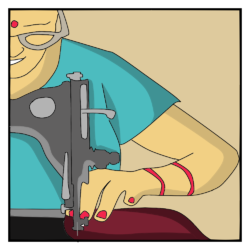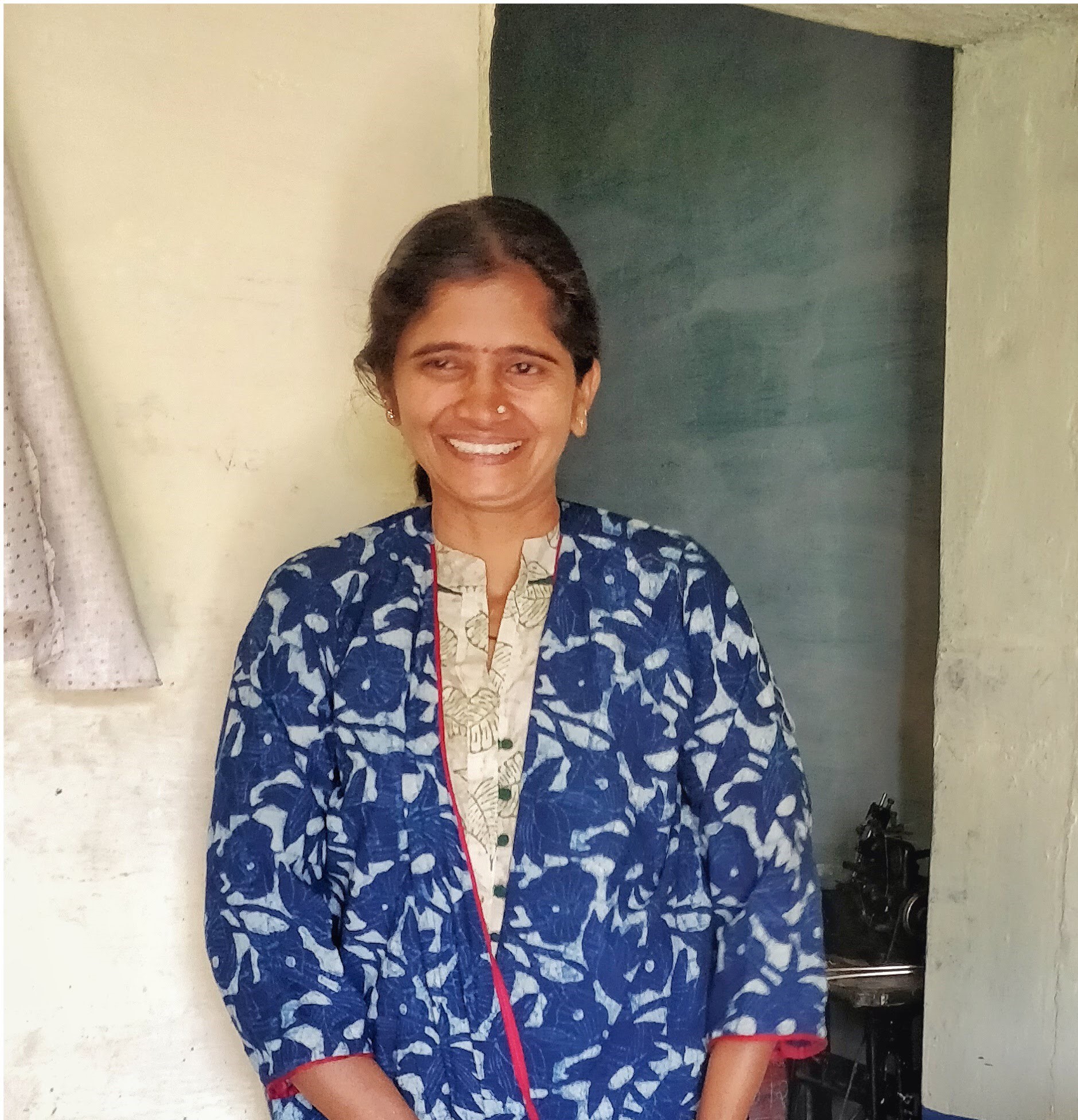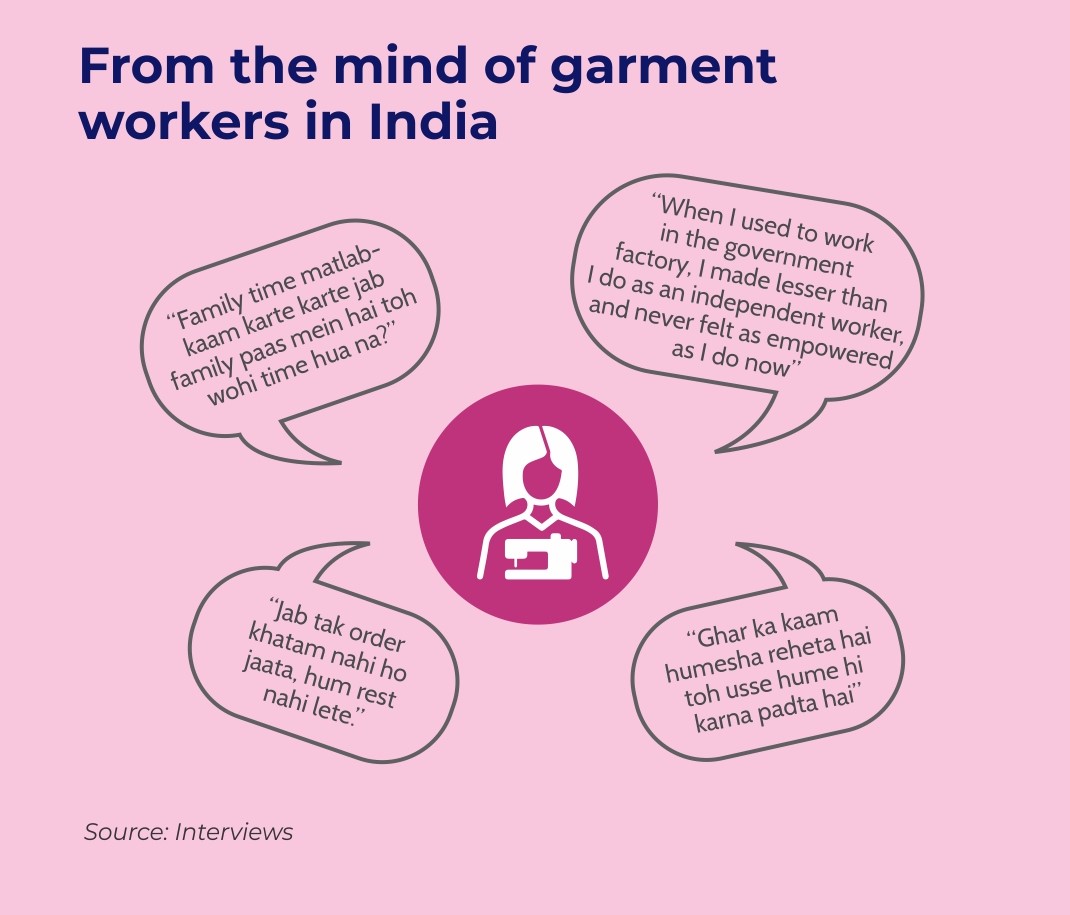July, 2020
Here are six lessons I learned from phone calls with two garment workers from Rajasthan and Maharashtra
6 minutes read
We’ve all experienced some form of this or the other – pain from someone you never expected to hurt you, the quiet classmate saying something sarcastic and becoming your best friend, the teacher who firmly practices tough love sticking up for you. I too had an experience where unexpected sources taught me somethings I’ll keep with me forever. As part of my research for this piece, I had two phone calls with two women working in the garment industry.

The first three lessons:
Pride. Respect. Hard Work.
Neelam Kharade (38) works with Swara, a brand that sells clothes designed and handcrafted by the rural women of Dungarpur in Rajasthan, where she resides with her two daughters and husband. Neelam’s work involves making garments, teaching women how to make them, and also helping in recruiting/employing these women based on their work for Swara. As her daughters are still receiving their secondary education, she and her husband are both working in the garment industry. Neelam herself has completed her Bachelor’s in Arts (BA), and hopes to make sure her daughters are graduates as well. Her daughters have helped her out with both housework and garment related work in their own capacity, as Neelam believes for their family to function smoothly everyone must contribute to the workload.
Neelam is very happy to be doing what she does since she’s had an interest in the domestic arts (especially making and mending clothes) since her childhood. When asked about a typical day in her life, Neelam claimed that it varied depending on the size of her order and she said she’s always driven to complete her goal for that day before resting. She estimated that a piece (once learned) takes about an hour and a half to make and she gets paid per piece. When questioned further about if she believes this system is fair as opposed to a more consistent salary, she explained how given the labour effort she’s put in, along with the amount she’s being paid per piece, she does believe that they are proportional and hence fair.
Her relationship with her employers is overall very positive as she is grateful for the impact Swara has had on her family as well as the women of Dungarpur. While she did express a desire once upon a time to migrate from the village and open a shop of her own, financial risks and constraints had held her back. However, it was with great pride and enthusiasm that she also mentioned how her family does not buy readymade clothes from the market (only the cloth) as she makes all the clothes for her family. During the lockdown although Swara offered any assistance their workers may require, Neelam did not ask for anything more than the bare minimum and as she clarified, not because of ego, pride or shame; but because she did not want to live beyond her means.
Throughout my conversation with Neelam, I picked up on how one of her core values is hard work and respect for one’s job which I found to be refreshing. Her value for respect extended beyond her work and was reflected in the way she conducted herself during the interview. Her demeanor did not command respect, rather it brought it out naturally with how she gave respect to me, a girl on the other end of the line much younger than she is.

Neelam, outside her house in Dungarpur
She’s always been aware that no matter what is happening around you if you don’t work, you don’t get paid and have thus imbibed into her personality. Neelam’s attitude is what the ideal form of the protestant work ethic is and whether she’s studied about it or not suddenly feels irrelevant. The interview was conducted over a phone call during the COVID-19 lockdown where one expects complaining and melancholy as a result of the negative environment. Despite it all, hearing Neelam’s story, her commitment towards her work, and her attitude towards it and in life, inspired me.
The next three lessons:
Teamwork. Ambition. Resilience.
Gargi G. Dongre (32) is an independent tailor based in Badlapur who works on blouse pieces and nauvari sarees exclusively. She lives in a joint family with her husband, two children, brother-in-law, and mother-in-law. She is one of the three people in the house who generates income for the family and hence, does not feel pressured to earn as much. She claims that this was something she was interested in even when she was younger and does not do this out of financial strains on the family. She studied until the 12th standard and her husband works with Podar International School as a computer engineer who also currently works from home. As Gargi explained how her days (pre-COVID) usually went, she often drew my attention to how every adult in the family contributed to making her day easier. As her children were young, they could not help her with anything else besides focusing on their education. Her mother-in-law would help out in picking up some slack with the housework or taking care of her children when she was busy with orders. Her husband, despite having a regular job, would help her out with cutting cloth in the evenings post-dinner. Everything sounded very wholesome so far into the interview. She further elaborated on how supportive he was of her doing this out of interest when he encouraged her to leave the government job she had in 2011; even when he was not earning enough. He supported her needs early on in their marriage, and as I was to find out during the course of the interview, stuck by her through thick and thin. She has a business card but usually relies on word of mouth for her work. While she works all year round, she said that the nature of her work is not as consistent as it piles up, usually closer to the time of Maharashtrian festivals.

Back when she used to do lacework on sarees at a government factory in Dahisar, she was paid 6,000 rupees per month. Today, as she works on an average of 2-3 pieces daily which range from rupees 150-250 (in blouses alone), she not only makes more (at least 50% more not accounting for inflation) but also most importantly, is in charge of her decisions with respect to her work. At this point into the call, I prodded her further on what her aspirations and future plans were with respect to her work. In November (2019) Gargi opened up a shop in Badlapur, with better machinery, and furnished it with her own money. Unfortunately, she was one of those small enterprises that were severely affected by the lockdown. She still is paying rent and is considering shutting her shop down permanently, but is worried about the loans she’d taken to set it up in the first place. She does not want to give up her shop yet and is presently working from her village near Raigad, Maharashtra until things settle down. While they say it takes a village to raise a child, in Gargi’s case it takes a supportive family to do the same. Gargi feels empowered because she feels respected in her marriage; the support from her family allowed her to be a woman with aspirations and someone confident enough to set up a shop. Her current struggles would generate crippling anxiety in me, but her sense of resilience which has her working wherever she may be, would be what could get me through it.
In a world where focusing on the scary stats, exploitation and the evil in the world has become the new norm; Neelam’s voice is that story of empowerment and drive we should all be looking at for a breath of fresh air. Despite the lockdown affecting Gargi harsher in comparison, I heard no complaining on her end either. While all of us go through our own struggles in life and none can truly be quantified, how we face them speaks to our resilience. All the above-mentioned qualities shone through my experiences with the women.
I believe that when profound lessons are taught by unexpected people they do stick. If speaking to just two women about their lives for longer than what constitutes a polite conversation taught me so much, I conclude wondering what talking to more of them could do.
The life lessons weren’t from their stories itself, but the way the phone call went, from Neelam referring to me as Preksha ji to Gargi redefining what ‘quality time’ with the family means. However, the stories cannot be discounted either, because contrary to the Gestalt theory, I think the whole could be greater than the sum of its parts, but it’s still the parts that make it whole.
References
- Remote interviews conducted by the team at Women’s Identity and Progress

Leave A Comment